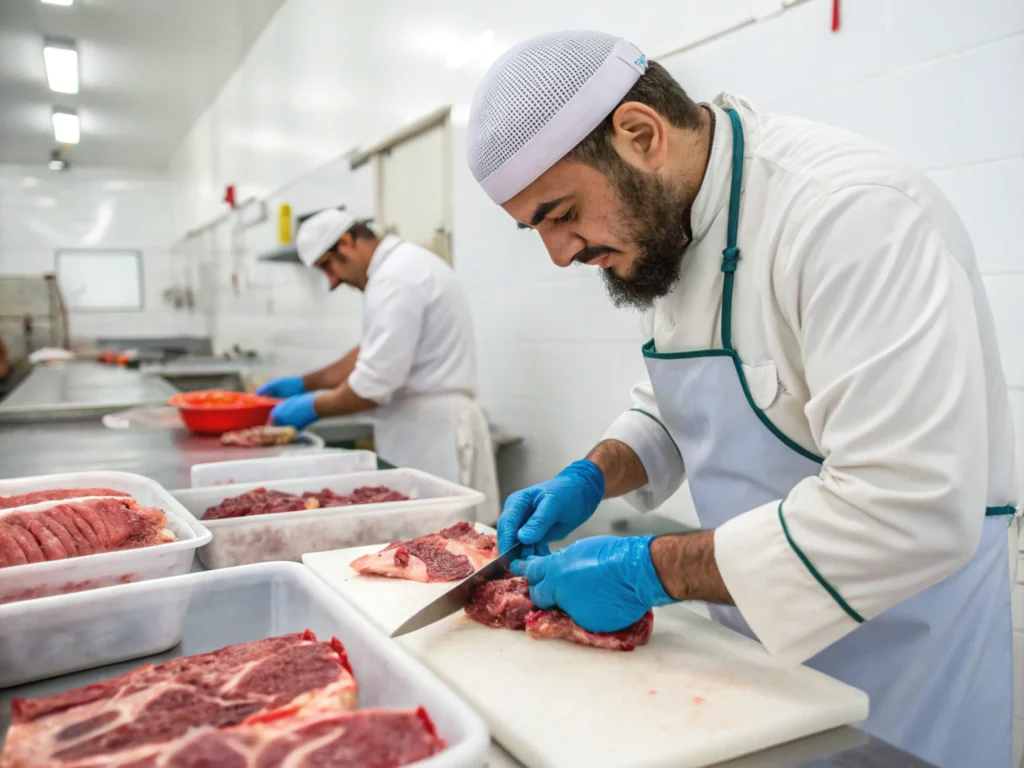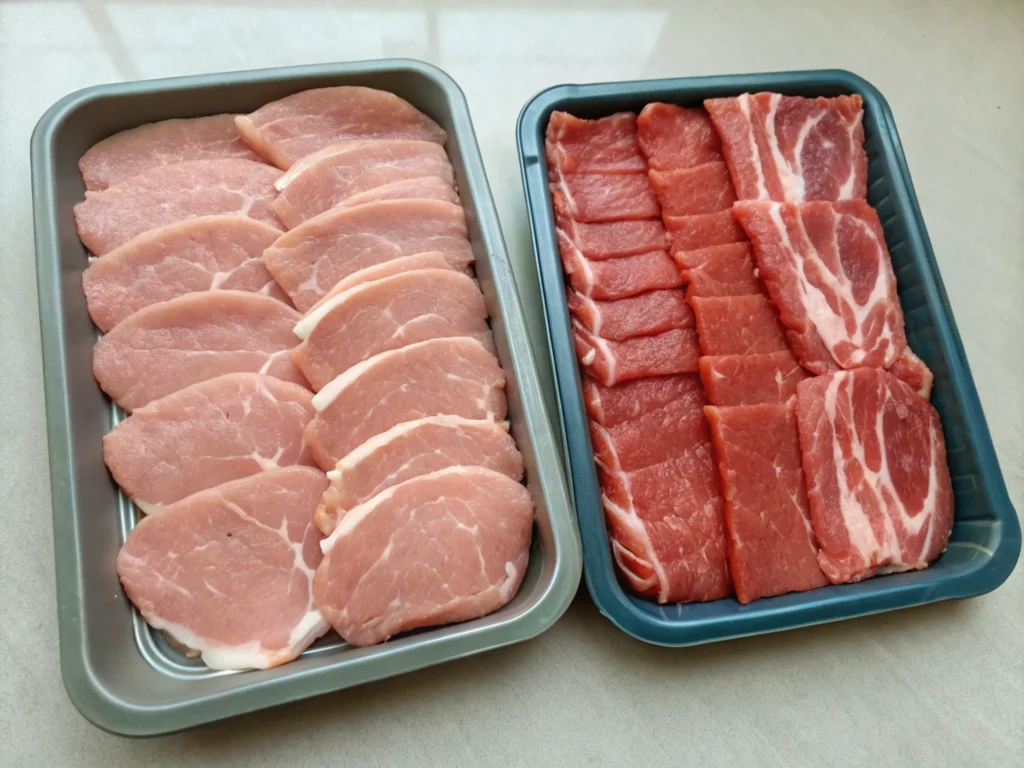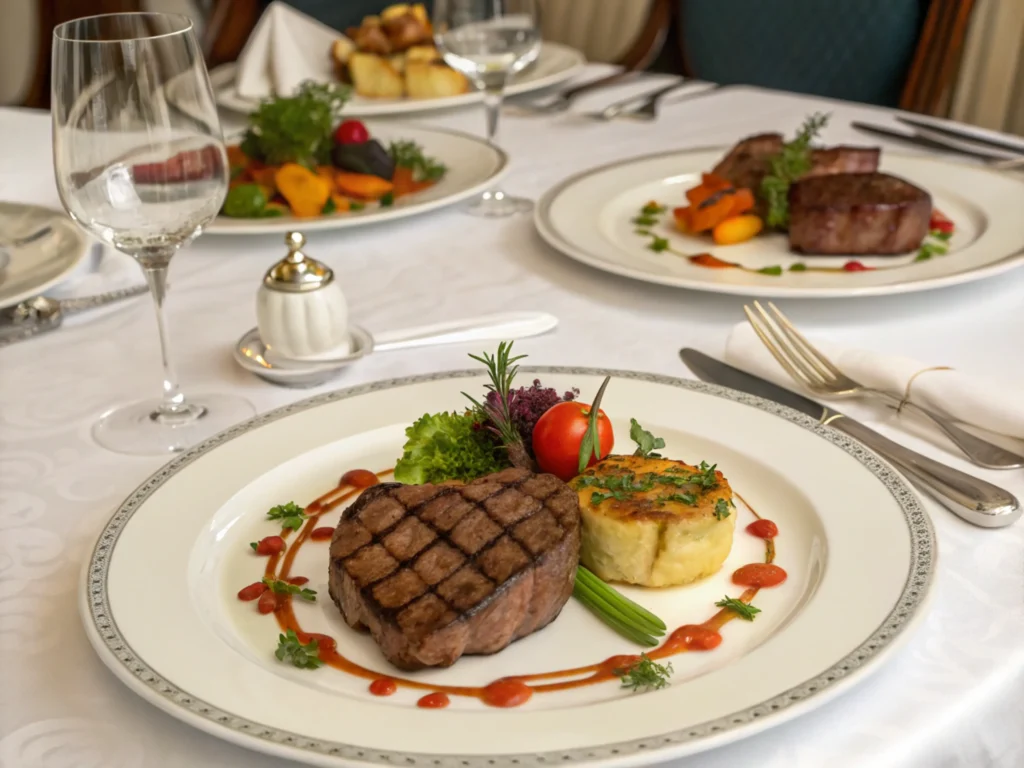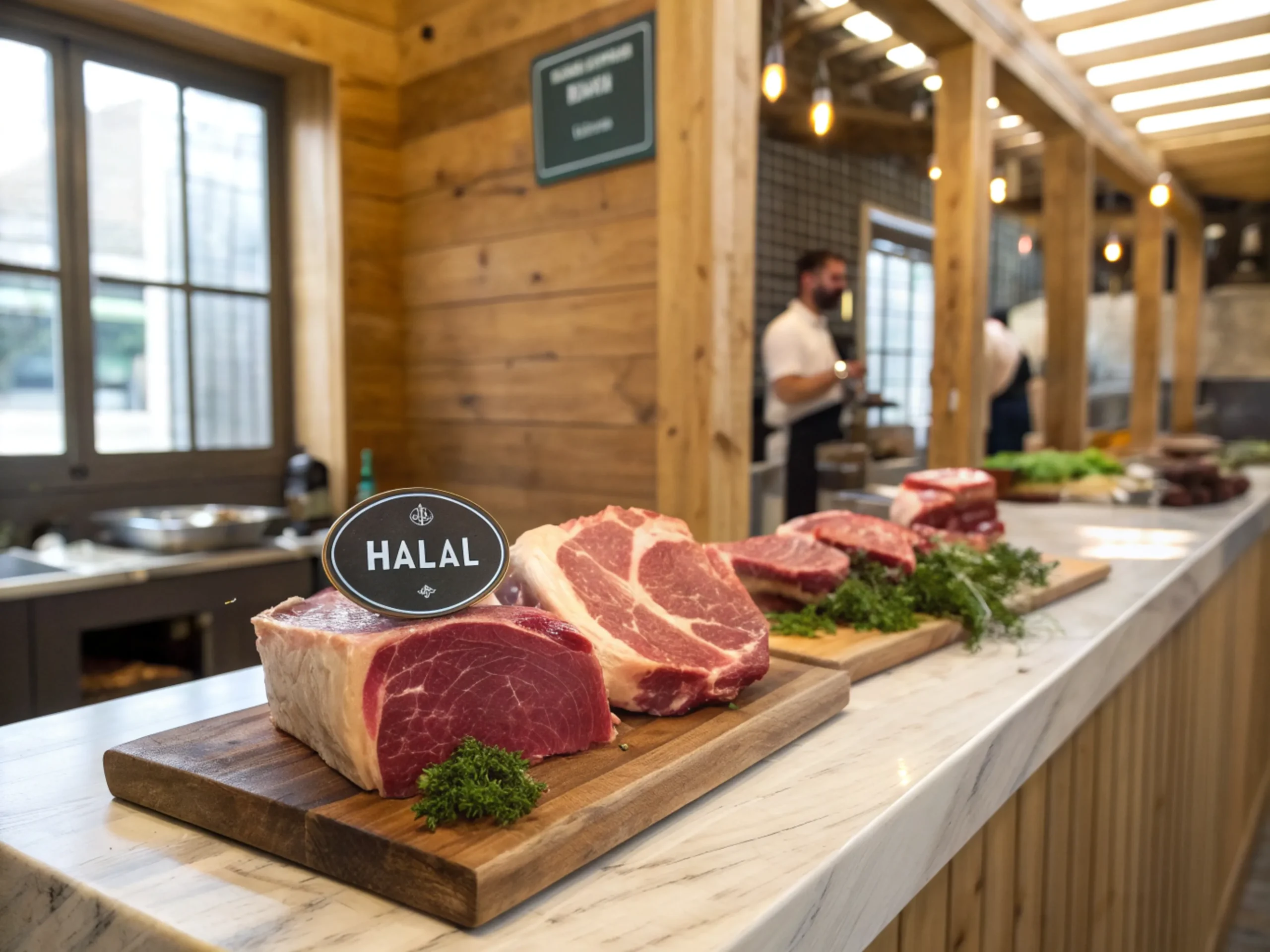What is halal beef meat? Halal beef meat is more than just food; it represents a commitment to ethical practices, cultural traditions, and health-conscious eating. For many, understanding halal practices is essential not only for dietary reasons but also for appreciating the principles that make it unique. In this article, we explore the key aspects of halal beef, including its preparation, ethical foundations, and health benefits, while addressing common questions. Whether you’re curious about its religious significance or its impact on health, this comprehensive guide has all the answers.
Table of contents
What Is Halal Beef Meat?
Halal, an Arabic term meaning “permissible,” is a dietary standard observed in Islam. Halal beef specifically refers to meat prepared in accordance with Islamic guidelines, ensuring it meets ethical, hygienic, and spiritual criteria. It involves a strict adherence to processes that prioritize cleanliness, humane practices, and spiritual observance.
How Halal Beef Differs from Regular Beef
The main distinction lies in the preparation. Halal beef must come from animals slaughtered following the Islamic ritual of Zabiha. This process includes:
- Reciting a prayer (Bismillah Allahu Akbar) before slaughter, invoking blessings and gratitude.
- Ensuring the animal is healthy and treated humanely prior to slaughter.
- Draining all blood from the carcass to maintain purity and hygiene.
Moreover, halal meat prohibits certain practices, such as using animals that have been improperly raised, fed prohibited substances, or killed inhumanely. These principles ensure that halal beef is not only religiously compliant but also ethically sourced.
For more details about halal meat preparation, you can read about what makes a burger halal, including insights into halal certification and processes.
Benefits of Halal Beef Meat
Religious and Cultural Significance
For Muslims, consuming halal beef fulfills an important religious obligation. Halal practices go beyond food; they reflect a deep respect for God’s creations and the environment. Many communities globally are now appreciating these principles for their ethical and spiritual value.
Ethical and Sustainable Practices
Halal beef represents a standard of care that extends to the animal’s treatment, from its living conditions to its diet. Ethical considerations, such as free-range farming and organic feeding, align halal beef with the global push for sustainable and humane food production.
- Animal Welfare: The Zabiha method ensures the animal is calm and treated with care before slaughter. This minimizes stress, which is not only more humane but also improves the quality of the meat.
- Environmental Awareness: Ethical practices in halal certification encourage sustainability by emphasizing responsible farming and minimizing waste.
Health Advantages
Halal beef is widely regarded as cleaner and healthier due to its preparation process:
- Cleanliness: The process removes blood, which can carry toxins, leading to a cleaner final product.
- Nutritional Value: Supporters argue that halal beef retains its natural flavor and nutrients due to humane handling.
For a deeper look into ethical and health considerations, explore our halal burger guide, which delves into why many choose halal for their health and moral values.
Understanding the Process of Halal Certification
Halal beef is not just about following a ritual; it’s about maintaining strict standards from farm to table. Halal certification ensures that every step of the process adheres to Islamic principles, providing consumers with transparency and trust.
Steps in Halal Certification
- Animal Selection: Animals must be healthy, well-fed, and from permissible species (e.g., cows, goats, lambs).
- Slaughter Process: The act must be quick and minimize pain, with a single cut severing the jugular vein to allow blood to drain completely.
- Inspection and Approval: Certification agencies inspect facilities to ensure compliance with halal standards.
- Labeling: Only products that meet these criteria receive a halal certification, ensuring consumer trust.

The rigorous standards of halal certification reflect the commitment to cleanliness, ethical practices, and spiritual observance. These standards reassure consumers that the meat they consume is both high-quality and aligned with their values.
Cooking with Halal Beef
Cooking with halal beef is as versatile as with any other meat. From hearty stews to juicy burgers, halal beef integrates seamlessly into various cuisines. One of its standout qualities is the richness of flavor preserved through ethical and clean preparation methods.
Example Recipe: Halal Beef Stew
Ingredients
| Ingredient | Amount | Notes |
|---|---|---|
| Halal beef cubes | 500g | Choose fresh, certified halal meat |
| Onions | 2 medium | Thinly sliced |
| Garlic | 3 cloves | Minced |
| Carrots | 2 large | Cut into chunks |
| Potatoes | 3 medium | Peeled and diced |
| Tomato paste | 2 tbsp | Adds richness |
| Beef broth | 4 cups | Halal-certified if store-bought |
| Olive oil | 2 tbsp | For sautéing |
| Salt and spices | To taste | Use cumin, coriander, and paprika |
Steps to Prepare
- Heat olive oil in a large pot over medium heat.
- Add onions and garlic; sauté until golden and aromatic.
- Add halal beef cubes and brown on all sides, sealing in the juices.
- Stir in carrots, potatoes, and tomato paste for added depth of flavor.
- Pour in beef broth, ensuring all ingredients are fully submerged.
- Cover the pot and simmer on low heat for 1.5–2 hours, or until the beef is tender.
- Taste and adjust seasoning before serving hot with crusty bread or rice.

This stew is a perfect example of how halal meat enhances flavor and nutrition. Its ethical preparation aligns with the values of both traditional and modern households.
Common Misconceptions About Halal Meat
Halal practices are, undeniably, often misunderstood. Accordingly, addressing these misconceptions is, unquestionably, key to fostering awareness and inclusivity.
Can Christians Eat Halal Meat?
Yes, Christians and people of other faiths can, undoubtedly, eat halal meat. Specifically, the preparation aligns with universal standards of hygiene and ethics. Moreover, many non-Muslims, notably, choose halal for its exceptional quality and clean preparation methods.
Is Halal Meat Healthier?
Supporters believe halal meat is healthier due to its thorough process of removing blood, which can carry impurities. While research on this topic is ongoing, the focus on cleanliness and quality control is widely appreciated.
Ethics and Sustainability in Halal Meat Practices
Halal beef is grounded in ethical principles, promoting humane treatment of animals and supporting sustainable farming practices. Its focus on clean, humane, and eco-friendly production distinguishes it from other methods.
- Animal Welfare Standards: Animals must be treated with care, avoiding undue stress or suffering. They are fed clean diets free from harmful additives.
- Sustainability: Halal certification often overlaps with sustainable farming, encouraging ethical livestock rearing and minimizing environmental impact.
By prioritizing these values, halal practices appeal not only to those seeking religious compliance but also to individuals concerned about the broader impact of their food choices.
To explore more about halal certification processes and ethical practices, check out our Mexican hot sauce guide, which discusses the importance of sourcing ethical ingredients.
Cooking Halal Beef: Bringing Versatility to the Kitchen
Cooking halal beef opens up a world of culinary opportunities. Whether you’re preparing traditional dishes or modern creations, the adaptability of halal beef makes it a favorite choice.
Popular Cooking Methods
- Grilling: Perfect for steaks and kebabs, grilling halal beef locks in flavor and moisture.
- Slow Cooking: Ideal for stews and roasts, slow cooking ensures tenderness and depth of flavor.
- Stir-Frying: For quick and healthy meals, halal beef stir-fry pairs well with vegetables and sauces.

How to Make Halal Beef Recipes Step-by-Step
Halal beef recipes are not only delicious but also align with ethical values. Following step-by-step instructions ensures your dish turns out perfectly every time.
Traditional Halal Beef Dish: Beef Tagine
This classic Moroccan dish combines tender halal beef with aromatic spices and dried fruits for a rich and satisfying meal.
Ingredients
| Ingredient | Amount | Notes |
|---|---|---|
| Halal beef chunks | 1 kg | Certified halal |
| Onions | 2 large | Thinly sliced |
| Garlic | 4 cloves | Minced |
| Olive oil | 3 tbsp | For sautéing |
| Spices (cumin, paprika, cinnamon) | 1 tsp each | Aromatic blend |
| Dried apricots | 1 cup | Adds sweetness |
| Vegetable broth | 3 cups | Halal-certified |
| Fresh cilantro | 2 tbsp | Chopped for garnish |
Instructions
- Heat olive oil in a large pot and sauté onions and garlic until golden.
- Add halal beef chunks and spices, stirring to coat the meat evenly.
- Incorporate dried apricots and pour in vegetable broth.
- Cover and simmer on low heat for 1.5 hours, stirring occasionally.
- Garnish with fresh cilantro and serve hot with couscous or rice.
Pro Tips & Variations for Cooking Halal Beef
Pro Tips
- Pre-Marination: Let the beef marinate in spices for at least 12 hours to enhance flavor.
- Cooking Temperature: Avoid overcooking halal beef to retain its tenderness and juiciness.
- Pairing Suggestions: Serve with sides like roasted vegetables, flatbreads, or spiced rice for a complete meal.
Creative Variations
- Spicy Fusion: Add chili paste or harissa for a fiery kick.
- Mediterranean Twist: Use rosemary, thyme, and lemon for a fresh, zesty profile.
- Asian Flavors: Incorporate soy sauce, ginger, and sesame oil for a savory and sweet balance.

FAQs About Halal Beef
The halal beef topic often raises questions. Here, we answer the most commonly asked questions to provide clarity.
What is the difference between beef and halal beef?
Halal beef is prepared according to Islamic guidelines, ensuring ethical and humane practices. Standard beef does not necessarily follow these rules, making halal beef unique in its preparation.
What makes meat halal?
Meat becomes halal when:
- It is sourced from permissible animals.
- The slaughter involves reciting a prayer.
- The blood is fully drained from the animal.
Can Christians eat halal meat?
Yes, Christians and others can eat halal meat. Its cleanliness, ethical preparation, and quality appeal to a wide range of people.
Is halal meat healthier?
Many believe halal meat is healthier because the removal of blood minimizes toxins. While scientific evidence is limited, its cleanliness is widely acknowledged.
Is halal beef organic?
Halal beef is not inherently organic. However, it can be both organic and halal if it meets specific farming and slaughtering standards.
What animals qualify as halal?
Animals like cows, goats, and sheep are considered halal, provided they are healthy and slaughtered according to Islamic practices.
Is halal meat more expensive?
The price of halal meat may be higher due to its stringent certification processes. However, the quality and ethical considerations often justify the cost.
For more inspiration, check out our buttery nipple shot guide, which explores unique combinations of flavors.
Conclusion
Halal beef, undeniably, represents a harmonious blend of ethics, health, and culinary excellence. Accordingly, its preparation aligns with values of sustainability and humane treatment, making it, without doubt, a meaningful choice for conscious consumers. Furthermore, whether you are exploring new recipes or seeking ethically sourced meat, halal beef, significantly, offers a versatile and flavorful option.
By integrating halal beef into your cooking, you are not just preparing a meal; rather, you are, explicitly, embracing a tradition that values respect for life and community. Moreover, try out new recipes, experiment with flavors, and, most importantly, savor the experience of cooking with halal beef. For official guidelines on meat processing and food safety, visit the USDA Food Safety and Inspection Service.

